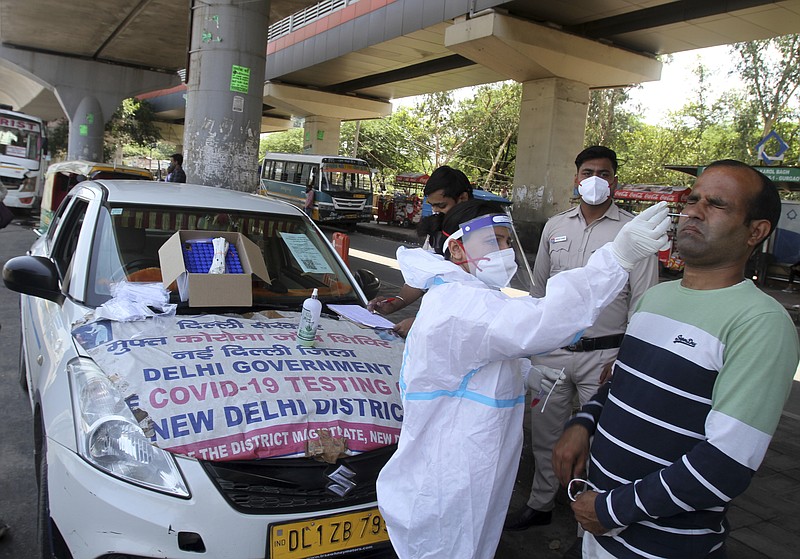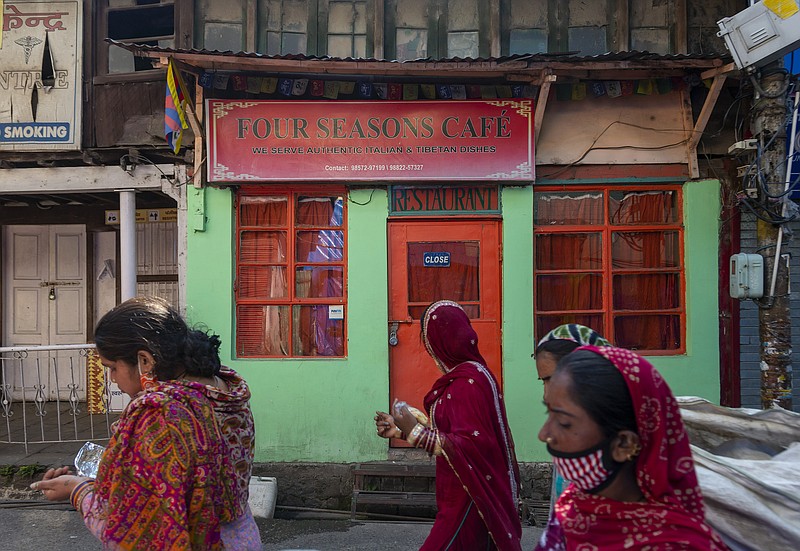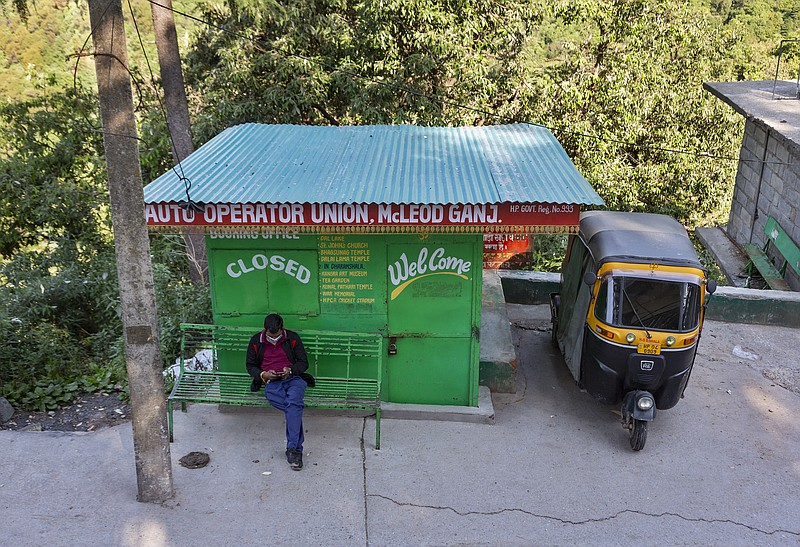NEW DELHI -- Doctors in India are fighting to treat a fungal infection affecting covid-19 patients or those who have recovered from the disease during a coronavirus surge that has driven the country's death toll to nearly 300,000.
The life-threatening condition, known as mucormycosis, is relatively rare, but doctors suspect that the sudden increase in fungal infections could further complicate India's fight against the virus.
India has reported more than 26 million confirmed cases of the coronavirus since the pandemic began, with almost half occurring in the past two months. On Sunday, the Health Ministry reported 3,741 new deaths, bringing India's confirmed fatalities to 299,266.
The country reported 240,842 new infections, with daily cases remaining below 300,000 for a week. The numbers are likely to be undercounts, with cases being missed due to limited testing.
Experts say new infections in India, which had been rising steeply, may finally be slowing. But there are some early indications that mucormycosis, also known as "black fungus," is fast becoming a cause of worry.
Mucormycosis is caused by exposure to mucor mold, which is commonly found in soil, air and the nose and mucus of humans. It spreads through the respiratory tract and erodes facial structures. Sometimes, doctors have to surgically remove a patient's eye to stop the infection from reaching the brain.
[Video not showing up above? Click here to watch » https://www.youtube.com/watch?v=0EuAbFg4fpM]
On Saturday, federal minister Sadananda Gowda said nearly 9,000 cases had been reported in India, leading to a shortage of Amphotericin B, the drug used to treat the condition.
Gowda didn't share the number of fatalities, but local media have said more than 250 people have died because of the disease.
Health officials were working to alleviate the drug shortage, which comes at a time when the country is already short on supplies of oxygen and other health care needs, Gowda said.
Mucormycosis has a high mortality rate and was already present in India before the pandemic. It is not contagious, but the frequency of cases in the past month has left doctors shocked.
"It is a new challenge, and things are looking bleak," said Ambrish Mithal, the chairman and head of the endocrinology and diabetes department at Max Healthcare, a chain of private hospitals in India.
Mithal said the fungal infection preys on patients who have weakened immune systems and underlying conditions, particularly diabetes, and who are given steroids indiscriminately. Uncontrolled blood sugar can put immunocompromised people at higher risk of contracting the disease.
"Earlier, I used to come across just a few cases every year, but the current infection rate is frightening," said Mithal.
The surge of coronavirus infections in rural India has already taken a toll. Now, heath experts are worried that over-the-counter medication, including steroids, can increase the prevalence of mucormycosis.
SK Pandey, a medical officer at Ram Manohar Lohia Hospital in Uttar Pradesh state's Lucknow city, said unqualified doctors were giving steroids to patients in many rural areas without giving a thought to whether they require the treatments.
"This has led to increase in black fungus cases in smaller cities where the patient has not even been hospitalized," he said.
India's Health Ministry on Thursday asked states to track the spread of the condition and declare it an epidemic, making it mandatory for all medical facilities to report the cases to a federal surveillance network.
Prime Minister Narendra Modi on Friday called the disease a "new challenge."
FIGHTING FOR SUPPLIES
Last year, Modi imposed one of the world's toughest lockdowns on the entire country, a move that slowed the virus but drove India into recession. This year, Modi has resisted a nationwide lockdown, leaving local governments to take their own steps.
Since April, families have scoured cities for coronavirus tests, medicine, ambulances, oxygen and hospital beds. When none of that works, some have to deal with the experience of having loved ones zippered into body bags.
India's states are competing against one another for oxygen, medicine and vaccine doses. and local officials have come under intense pressure.
"There has been a tendency to centralize decisions when things seemed under control and to deflect responsibility toward the states when things were not," said Gilles Verniers, a professor of political science at Ashoka University.
To fill the gaps left by the stumbling response of the central government, a system of local officials, online networks, charities and volunteers has emerged in a suburb of Kochi, a city in the southern Indian state of Kerala. Kerala officials have stepped in where India's central government has struggled, in many ways, to provide relief for victims of the world's worst coronavirus outbreak.
Though supplies have tightened, Kerala's hospitals enjoy access to oxygen, with officials having expanded production months ago. Coordination centers, called war rooms, direct patients and resources. Doctors there talk people at home through their illnesses. Kerala's leaders work closely with on-the-ground health care workers to watch local cases and deliver medicine.
"Kerala stands out as an exceptional case study when it comes to proactive pandemic response," said Dr. Giridhar Babu, an epidemiologist at the Public Health Foundation of India, which is based in the northern city of Gurugram. He added that "their approach is very humane."
Kerala is by no means out of trouble. Deaths are rising. Workers face long hours and tough conditions. And the situation could still worsen as the outbreak spreads.
On paper, Kerala's death rate, at less than 0.4%, is one of India's lowest. But even local officials acknowledge that the government's data is lacking. Dr. Arun N.M., a physician who monitors the numbers, estimates that Kerala is catching only 1 in 5 deaths.
Kerala's policies can be traced to the earliest days of the coronavirus outbreak, when a student returning from Wuhan, China, in January 2020 became India's first recorded case. Officials had learned lessons from successfully tackling a 2018 outbreak of the Nipah virus, a rare and dangerous disease.
As borders closed last year and migrant workers returned home, the state's disaster management team swung into action. Returning passengers were sent into home quarantine. If people tested positive, then local officials traced their contacts. Kerala's testing rate has been consistently above India's average, according to health data.
Experts say much of the credit for the system lies with K.K. Shailaja, a 64-year-old former schoolteacher who until last week was Kerala's health minister. Her role in fighting the Nipah virus inspired a character in a 2019 movie.
"She led the fight from the front," said Rijo M. John, a health economist from the Rajagiri College of Social Sciences in Kochi. "Testing, tracing and tracking of contacts was very rigorous from the beginning."
To coordinate resources, Kerala officials assembled the war rooms, one for each of the state's 14 districts.
The war rooms collect a variety of data, said Dr. Aneesh V.G., a medical officer in the district of Ernakulam, where a team of 60 staffers, including 30 doctors, monitors oxygen supplies, hospital beds, ambulances and the district's more than 52,000 covid-19 patients.
When doctors, via telephone, determine that a patient needs to be hospitalized, they notify the war room. Case numbers pop up on a giant screen. Workers decide what kind of care each person needs and then assign a hospital and an ambulance.
A separate group monitors oxygen supplies, calculating the burn rate of each hospital. Pointing to a screen, Eldho Sony, a war room coordinator, said that "we know who needs supply urgently and where it can be mobilized from."
Dr. Athul Joseph Manuel, one of the doctors who designed the war room, said triage had been crucial.
"In many cities across the world, lack of medical resources was not the primary issue," he said. "It was the uneven distribution of cases that led to many hospitals getting overwhelmed."
Other places have set up similar centers, with varying effectiveness. Health experts say Kerala's have worked because the state has a history of investing in education and health care. It has more than 250 hospital beds per 100,000 people, roughly five times India's average, according to government and World Health Organization data. It also has more doctors per person than most states.
Officials have also worked closely with state health clinics and with local members of a national network of accredited social health activists, known in India as ASHAs. The workers make sure that patients stick to their home quarantines and can get food and medicine. They also preach mask-wearing, social distancing and the virtues of vaccination. Kerala's share of fully vaccinated people is nearly double the national average of 3%.
Kerala has also won praise for how it has tracked virus variants.
Scientists are studying whether a variant first found in India has worsened the country's outbreak, though they have been hindered by a lack of data. Kerala has used gene sequencing since November to track variants, helping to drive policy decisions, said Dr. Vinod Scaria, a scientist at the CSIR Institute of Genomics and Integrative Biology in New Delhi.
"It's the only state that has not given up at any point in time," Scaria said, adding that "they're eager to use evidence to drive policies."
Information for this article was contributed by Sheikh Saaliq, Biswajeet Banerjee, Aniruddha Ghosal and Aijaz Hussain of The Associated Press; and by Shalini Venugopal Bhagat of The New York Times.


